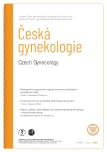Discrepancies in staging and perioperative classification of pelvic endometriosis according to #Enzian 2021
Authors:
K. Križanová 1; R. Chvátal 1
; V. Križan 1; M. Shibaeva 1; R. Hudeček 2
Authors‘ workplace:
Centrum pro léčbu endometriózy, Nemocnice Znojmo, p. o.
1; Gynekologicko-porodnická klinika LF MU a FN Brno
2
Published in:
Ceska Gynekol 2024; 89(1): 16-21
Category:
Original Article
doi:
https://doi.org/10.48095/cccg202416
Overview
Aim: The aim of this study is to compare the extent of ovarian endometriosis diagnosed at preoperative staging with subsequent perioperative findings. Definition of discrepancies observed according to the #Enzian 2021 classification. Material and methods: The cohort includes 62 patients of reproductive age with preoperative findings of ovarian endometrioma. Patients were divided according to the #Enzian 2021 classification into subgroups (O1, O2 + O3) with unilateral and bilateral findings. The percentage concordance of preoperative and perioperative findings was evaluated. Results: In the evaluation of ovarian involvement, the preoperative ultrasound diagnosis shows almost 100% agreement with the findings on the ovaries during surgery. Periadnexal adhesions were predicted preoperatively in only half of the cases. The difference in laterality was confirmed with T3 involvement in the O2 + O3 subgroup. In the bilateral involvement, the finding of the presence of grade 3 adhesions was doubled. An association of ovarian form of endometriosis (O2–O3) with deep infiltrating endometriosis of the small pelvis was observed in 50% of the cohort. Conclusion: The ovarian form of endometriosis is associated with the occurrence of other endometriosis lesions in the small pelvis. In this study, it was confirmed that preoperative staging underestimates the extent of endometriosis in the small pelvis. In the surgical management of ovarian endometriosis, extensive adhesive process should be expected.
Keywords:
endometrioma – staging classification – #Enzian 2021 – discrepancy – ovarian form of endometriosis
Sources
1. Lenz J, Chvátal R. Endometrióza. Praha: Grada Publishing 2021.
2. Allaire C, Bedaiwy MA, Yong PJ. Diagnosis and management of endometriosis. CMAJ 2023; 195 (10): E363–E371. doi: 10.1503/cmaj.220 637.
3. Kwok H, Jiang H, Li Tian et al. Lesion distribution characteristics of deep infiltrating endometriosis with ovarian endometrioma: an observational clinical study. BMC Womens Health 2020; 20 (1): 111. doi: 10.1186/s12905-020-009 74-y.
4. Keckstein J, Saridogan E, Ulrich UA et al. The #Enzian classification: a comprehensive non‐invasive and surgical description system for endometriosis. Acta Obstet Gynecol Scand 2021; 100 (7): 1165–1175. doi: 10.1111/aogs.14 099.
5. Sasaran V, Bad CM, Muresan D et al. Ultrasound pattern and diagnostic accuracy of primary ovarian endometrioma and its recurrence: a pictorial essay. Med Ultrason 2020; 22 (2): 230–235. doi: 10.11152/mu-2331.
6. Keckstein J, Hoopmann M, Merz E et al. Expert opinion on the use of transvaginal sonography for presurgical staging and classification of endometriosis. Arch Gynecol Obstet 2023; 307 (1): 5–19. doi: 10.1007/s00404-022-067 66-z.
7. Daniilidis A, Grigoriadis G, Dalakoura D et al. Transvaginal ultrasound in the diagnosis and assessment of endometriosis – an overview: how, why, and when. Diagnostics (Basel) 2022; 12 (12): 2912. doi: 10.3390/diagnostics12122912.
8. Koninckx PR, Fernandes R, Ussia A et al. Pathogenesis based diagnosis and treatment of endometriosis. Front Endocrinol (Lausanne) 2021; 12: 745548. doi: 10.3389/fendo.2021.745548.
9. Horne AW, Missmer SA. Pathophysiology, diagnosis, and management of endometriosis. BMJ 2022; 379: e070750. doi: 10.1136/bmj- 2022-070750.
10. Xu B, Lin L, Pan Y et al. The clinical picture and fecundity of primary and recurrent ovarian endometriosis with family history: a retrospective analysis. J Clin Med 2023; 12 (5); 1758. doi: 10.3390/jcm12051758.
11. Alson S, Jokubkiene L, Henic E et al. Prevalence of endometrioma and deep infiltrating endometriosis at transvaginal ultrasound examination of subfertile women undergoing assisted reproductive treatment. Fertil Steril 2022; 118 (5): 915–923. doi: 10.1016/j.fertnstert.2022.07. 024.
12. Moss KM, Doust J, Homer H et al. Delayed diagnosis of endometriosis disadvantages women in ART: a retrospective population linked data study. Hum Reprod 2021; 36 (12): 3074–3082. doi: 10.1093/humrep/deab 216.
13. Guerriero S, Saba L, Pascual MA et al. Transvaginal ultrasound vs magnetic resonance imaging for diagnosing deep infiltrating endometriosis: systematic review and meta-analysis. Ultrasound Obstet Gynecol 2018; 51 (5): 586–595. doi: 10.1002/uog.18961.
Labels
Paediatric gynaecology Gynaecology and obstetrics Reproduction medicineArticle was published in
Czech Gynaecology

2024 Issue 1
Most read in this issue
- Ultrasound finding of endometrial polyp and factors increasing risk of malignancy
- Importance of vaginal packing after laparoscopic sacrocolpopexy – retrospective study
- Diagnostika a léčba endometriózy
- Female orgasm, reproduction and couple relationships
